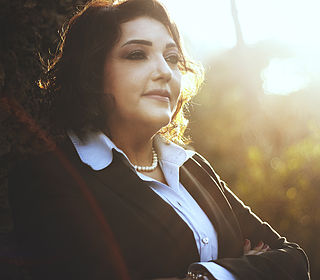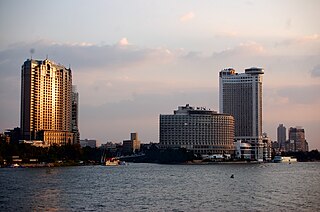
The Prime Minister of Egypt is the head of the Egyptian government.

The Cabinet of Egypt is the chief executive body of the Arab Republic of Egypt. It consists of the Prime Minister and the cabinet ministers.

Ain Shams University, Faculty of Medicine or School of Medicine, is a public Egyptian graduate school and one of the faculties of Ain Shams University. Now, it is one of the largest educational medical institutions in Africa and the Middle East. It was founded in 1947, making it the third oldest medical school in Egypt. It has promoted numerous programs of medical care to serve society, in addition to environmental development and continuous scientific research for local and international health. It became part of Ain Shams University in the 1950s, when it was established after adding several faculty members. Each year the faculty holds an annual conference dedicated to the recent advances in medical science.

The Ministry of Interior of Egypt is a part of the Cabinet of Egypt. It is responsible for law enforcement in Egypt. On March 5, 2015 Magdy Abdel Ghaffar was appointed Minister of Interior.

A presidential election was held in Egypt in two rounds, the first on 23 and 24 May 2012 and the second on 16 and 17 June. The Muslim Brotherhood declared early 18 June 2012, that its candidate, Mohamed Morsi, won Egypt's presidential election, which would be the first victory of an Islamist as head of state in the Arab world. It was the second presidential election in Egypt's history with more than one candidate, following the 2005 election, and the first presidential election after the 2011 Egyptian revolution which ousted president Hosni Mubarak, during the Arab Spring. Morsi, however, lasted little over a year before he was ousted in a military coup in July 2013.

The following is a chronological summary of the major events that occurred during the Egyptian Revolution of 2011, after Hosni Mubarak's resignation as the fourth President of Egypt, on 11 February 2011. This article documents the second wave of the revolution. The second wave began on 12 February 2011 when the Supreme Council of the Armed Forces assumed control of the country and it ended on 30 June 2012, when Mohamed Morsi was sworn in as the fifth President of Egypt.

Essam Abdel-Aziz Sharaf is an Egyptian academic who was the Prime Minister of Egypt from 3 March 2011 to 7 December 2011. He served as Minister of Transportation from 2004 to 2005.
The trials and judicial hearings following the 2011 Egyptian Revolution were a series of legal moves to establish accountability among the various Egyptian government officials and prominent businessmen.

Kamal Abbas is General Coordinator of the Center for Trade Unions and Workers Services (CTUWS), an activist group for independent unions in Egypt. Involved in activism for over 20 years, Abbas has been active in mobilizing worker support during the Egyptian Revolution of 2011 and its aftermath. His approach emphasizes peaceful strikes and rallies accompanied by demands for better wages and working conditions, as well as more regular elections for union officials, and an independent union system.

Wael Khalil is an Egyptian political activist known for his criticism of the Mubarak regime, his activity during the 2011 Egyptian revolution, and his blog WaELK.net which covers government, activism and sports.
Reem Maged is an Egyptian journalist and former host of the popular Baladna bel Masry talk show on Egyptian ONTV. Maged's popularity and renown have dramatically increased due to her critical coverage of political events since the 2011 Egyptian revolution, as well as her hosting of individuals on her show that are critical of the military Supreme Council of the Armed Forces, or SCAF, that has ruled Egypt since the resignation of Hosni Mubarak. She has been described as "Egypt’s best and arguably most vocal [female voice] in delivering the true happenings to the country on a nightly basis." Maged stopped presenting the show in 2013 and in 2014 joined a hunger strike campaign in solidarity with political prisoners.

The following chronological summary of major events took place during the 2011 Egyptian revolution right up to Hosni Mubarak's resignation as the fourth President of Egypt on 11 February 2011.
Momtaz El-Saeed is an Egyptian civil servant who served in the government of Egypt as minister of finance from 2011 to 2013.

The Misr Spinning and Weaving Company, also known as Misr Helwan or the El-Ghazl factory, is a large, publicly owned textile company located in El-Mahalla El-Kubra within the Nile Delta of Egypt, approximately 80 kilometers north of Cairo. The company's current board chairman is Mohamed Moheb Salah Elden. Egypt's largest industrial facility, Misr Helwan employs over 25,000 workers, many of whom have played an active role in Egyptian labor struggles. Large protests and strikes at Misr Helwan since 2006 contributed to the collapse of the Mubarak government, the 2011 Egyptian revolution, and the Arab Spring more generally.

Ahmed Ragab Seada a human rights activist, a labor leader in the petroleum sector, and occupies the Executive Directorof the National Organization of modern human rights and human development in Egypt.

The Ministry of Antiquities is the Egyptian government organization which serves to protect and preserve the heritage and ancient history of Egypt.

The Road of the Revolution Front – Revolutionaries, also translated as Way of the Revolution Front and Revolution Path Front, is an Egyptian political movement created in September 2013 by leftist and liberal activists in order to achieve the goals of the Egyptian Revolution of 2011 of bread, freedom and social justice.

Gameela Ismail is an Egyptian politician, activist, and former television presenter. She was actively involved in calling for and participating in the January 25 Revolution.

Mostafa Kemal Madbouly is the current Prime Minister of Egypt. He was appointed by President Abdel Fattah el-Sisi to succeed Sherif Ismail following his government's resignation in the wake of Sisi's re-election. Madbouly also serves in the Egyptian Government as Minister of Housing and Urban Utilities, and has also briefly served as interim Prime Minister.

















